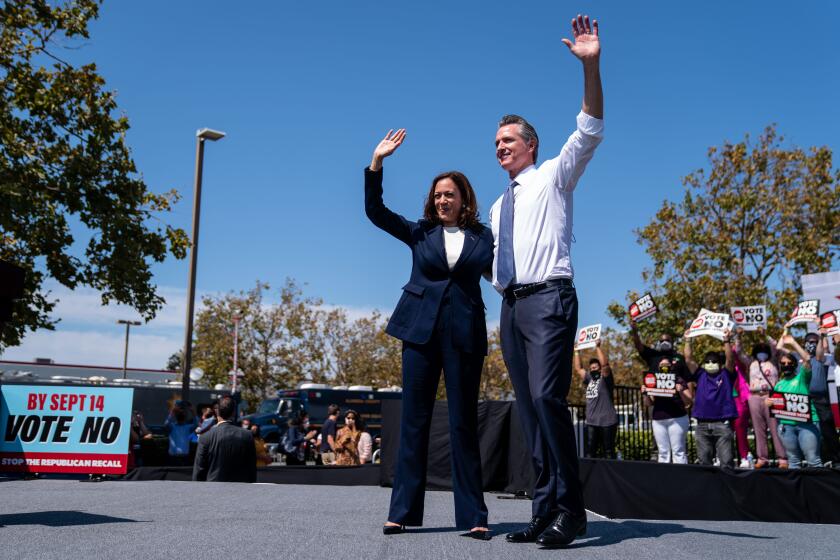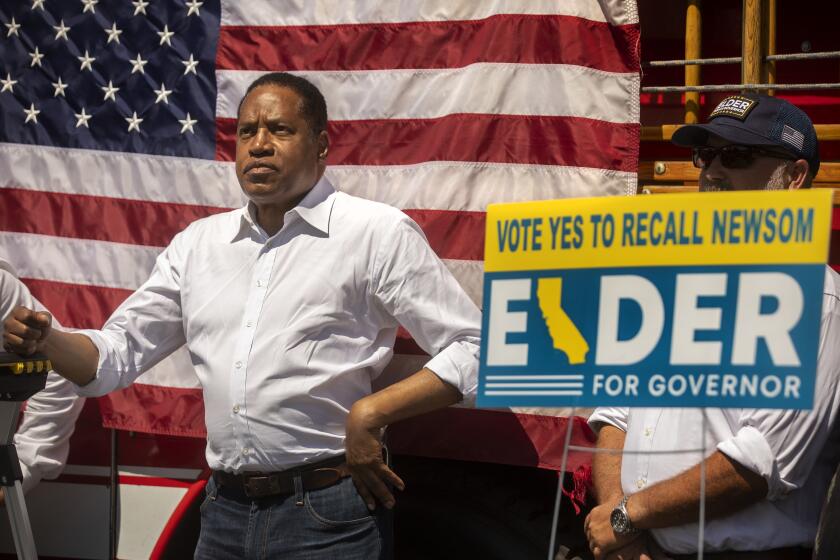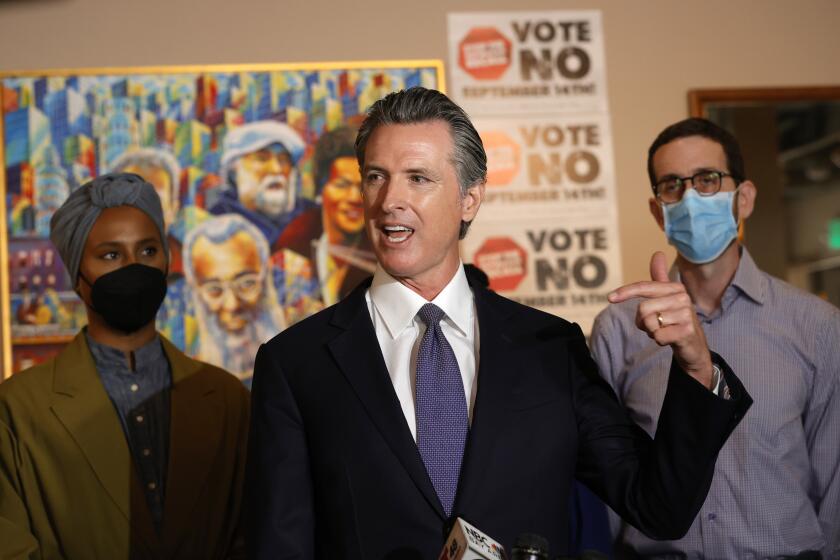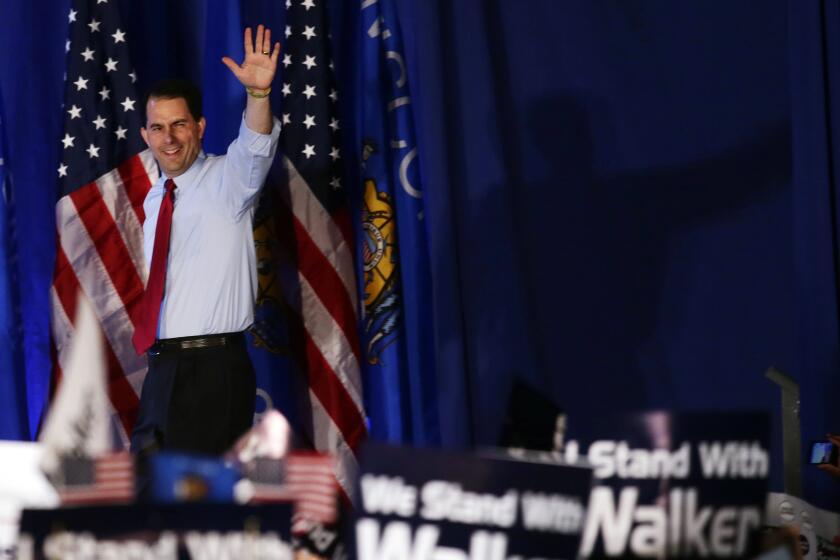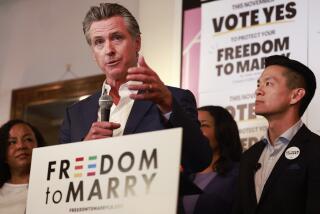Q&A: Who wants to replace Gov. Gavin Newsom in the recall election?
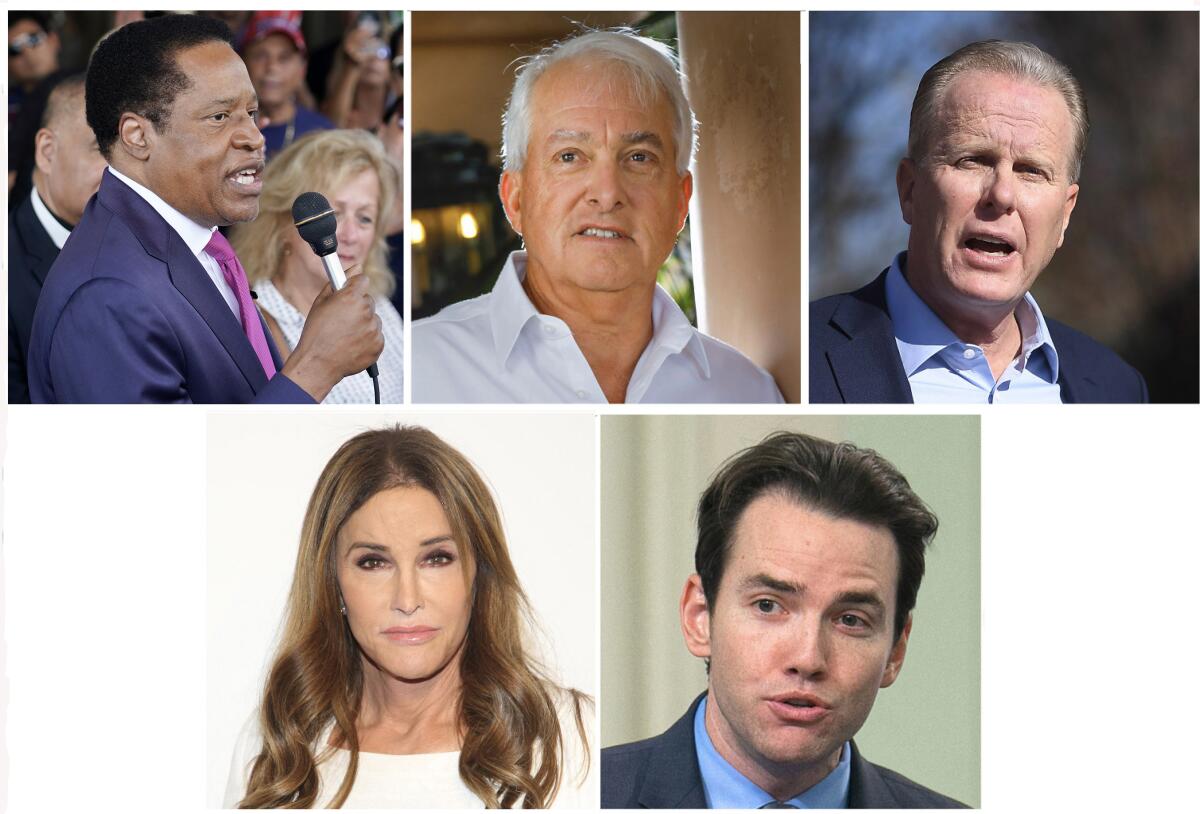
- Share via
As the effort to oust Gov. Gavin Newsom heads to the ballot on Sept. 14, a key question is whom voters would pick to replace him. Here’s a look at how that part of the election would play out.
If Newsom is successfully recalled, what is the process to replace him?
The special recall election has been scheduled for Sept. 14. Voters will be asked two questions on the ballot. The first is whether they want to get rid of Newsom. The second is if Newsom is recalled, regardless of how they voted on the first question, who do they want to replace him?
If more than 50% of voters support ousting Newsom, then the top vote-getter in the second question automatically becomes governor, regardless of how many votes that person gets.
Poll shows 60.1% of likely voters surveyed oppose recalling Newsom compared to 38.5% in favor of ousting the governor.
What are the qualifications to run?
Candidates had until July 16 to file papers to run.
Candidates must be American citizens who are registered to vote, or qualified to vote, at the time they obtain nomination papers. They cannot have been convicted of offering, giving or taking a bribe, embezzling public money, perjury or related crimes. They cannot run if they have served two terms as governor since Nov. 6, 1990 (so, no, Jerry Brown cannot run again). They must also submit 65 to 100 valid signatures on their nominations papers, pay a $4,194.94 filing fee or turn in at least 7,000 valid signatures in lieu of the filing fee, according to the secretary of state’s office.
California Secretary of State Shirley Weber has declared that Newsom’s recall rivals must release five years of tax returns prior to the election, based on a law passed by the state Legislature in the aftermath of President Trump’s refusal to furnish such records. Legal experts from both sides disputed Weber’s interpretation of the law, and a California Superior Court judge on July 21 ruled that it did not apply to recall elections.
The target of the recall — Newsom — is barred from appearing on the replacement section of the ballot.
Democrats have returned more than half of the 6.6 million ballots mailed in so far; Republicans account for a quarter.
Who is running?
Though more than 70 candidates filed preliminary paperwork with the Fair Political Practices Commission to run for governor during the recall, 46 will appear on the ballot, the secretary of state’s office announced July 21. However, one of them — former Rep. Doug Ose — withdrew from the race in August after suffering a heart attack.
Five prominent Republicans are among the candidates who are still campaigning to replace Newsom:
- Larry Elder. The nationally syndicated conservative radio host is the front-runner among the replacement candidates. He announced on his show July 12 that he was entering the race. He did not appear on the list of candidates who state election officials said had met the requirements to qualify for the ballot, but his campaign insisted that this was an error that would be corrected. A judge ruled in his favor on July 21. Elder, who calls himself “the Sage from South Central,” is a lawyer, documentary maker and writer who is well known in GOP circles and frequently appears on Fox News. The registered Republican, 69, contemplated challenging former U.S. Sen. Barbara Boxer in 2010 but did not run. In recent weeks, he has drawn scrutiny for offensive views about issues such as women’s rights as well as his behavior.
- Former San Diego Mayor Kevin Faulconer. The 54-year-old served as a San Diego City Council member from 2006 to 2014, and as mayor from 2014 to 2020. The fiscal conservative and social liberal frequently touted his ability to get elected in a Democratic city; San Diego was the largest city with a Republican mayor during his tenure. He is tight with mainstream Republicans such as House Minority Leader Kevin McCarthy of Bakersfield, which could potentially give him access to a trove of wealthy GOP donors. Faulconer has long been touted as the most likely California Republican to win statewide office, but he is mired in the single digits in recent polling.
- Businessman John Cox. The multimillionaire, 65, made his fortune in real estate, investments and property management. He has used his wealth to fund several unsuccessful runs for office — Congress in 2000, Senate in 2002, Cook County (Ill.) Recorder of Deeds in 2004, U.S. president in 2008 and governor of California in 2018. In that last contest, he spent $5.7 million of his own money on the race, and lost by a historic margin to Newsom. The Rancho Santa Fe resident has also unsuccessfully pushed quixotic ballot measures such as vastly expanding the size of the Legislature and requiring lawmakers to wear the logos of their top 10 donors on the floor of the Capitol, as NASCAR drivers display the logos of their sponsors on their cars during races. In the current campaign, he has drawn the greatest attention for bringing a 1,000-pound Kodiak bear named Tag and an 8-foot-tall ball of trash on the campaign trail.
- Caitlyn Jenner. The Olympic decathlete turned reality TV star’s announcement that she was running invited immediate comparisons to Arnold Schwarzenegger’s successful run during the 2003 recall that ousted Gov. Gray Davis, though the action star had greater involvement in California policy before running for governor than the reality star does. Jenner, a transgender woman and lifelong Republican, has described herself as an economic conservative and social liberal. The 71-year-old considered running against Sen. Dianne Feinstein in 2018 but did not. Despite her fame, Jenner has failed to gain traction in the polls. At one point she decamped from the campaign trail to fly to Australia for weeks to film a reality television show.
- Assemblyman Kevin Kiley. The 36-year-old lawyer has been among Newsom’s most acerbic critics. Kiley was one of two GOP lawmakers who sued Newsom over his use of executive orders during the pandemic. A superior court ruled in their favor, but an appeals court overturned the decision. Kiley has served in the Legislature since 2016, representing parts of Sacramento, Placer and El Dorado counties. Kiley, who has advocated for charter schools and parental choice, announced on July 6 that he is running. Ose, a multimillionaire who once owned a cattle farm with Kiley, endorsed him after leaving the race.
Newsom allies pay top dollar to hold the governor’s seat in deep blue California
Others who are running include:
- California Board of Equalization member Ted Gaines. The El Dorado Hills resident has served on the tax commission since January. The 63-year-old Republican served in the state Legislature for more than 12 years.
- Jeff Hewitt. The Riverside County supervisor is among the most prominent Libertarians in elected office in the nation. Hewitt, 67, previously ran a pool business and served on the Calimesa City Council. In an op-ed in the Orange County Register, Hewitt said he is running because he believes the state government has grown too powerful and capricious, problems that were exacerbated by the pandemic. He also said his status as a third-party candidate allows him to work with Democrats and Republicans to create bipartisan solutions.
- Steve Chavez Lodge. The retired homicide detective is the fiancé of Vicki Gunvalson, who appeared on the “Real Housewives of Orange County” reality television show for 15 years. Lodge, 62, is a veteran and a consultant who has worked on local government commissions. The Republican announced his candidacy on Instagram in late June, saying he could restore California to its former glory.
- Sam Gallucci. The 60-year-old Republican started his career in technology, ultimately becoming the executive vice president and general manager of PeopleSoft. The company was acquired for $10.3 billion by Oracle in 2004. Gallucci then turned his attention to nonprofit and spiritual work, becoming the senior pastor of Embrace! Church in Oxnard. He also founded efforts to help at-risk women and children and migrant workers.
- Kevin Paffrath. The social media influencer and real estate executive is among nine Democrats who qualified for the ballot. He’s 29 years old and has more than 1.6 million followers on his YouTube channel. He has issued policy papers that include the lofty goals of ending homelessness in three months and building half a million homes per year. During a debate, Paffrath drew widespread ridicule after proposing the construction of a water pipeline from California the Mississippi River. He lost a legal bid to have his nickname, “Meet Kevin,” included on the ballot because it was trademarked.
Scott Walker is the only governor in U.S. history to successfully beat a recall. Gavin Newsom’s campaign is trying to emulate his success, but there are key differences in the dynamics.
Are there any prominent Democrats running?
There are nine registered Democrats on the ballot but none well known to the public. Newsom and his allies were successful in keeping prominent Democrats out of the race, allowing them to present a united Democratic front and to continue painting the recall as a GOP power grab to accomplish through a special election what it can’t through a regular campaign. That also avoids a repeat of the 2003 recall, when Davis allies believe Lt. Gov. Cruz Bustamante’s decision to run as an insurance option in case the recall was successful cost the governor Democratic votes.
Among the Democrats who decided not to run is former Los Angeles Mayor Antonio Villaraigosa.
“I respect the fact the recall qualified. I also recognize that many people disagree with the governor and some of his decisions — including me — but California’s facing incredible challenges and the governor deserves a chance to finish the job,” Villaraigosa said. “That’s why I oppose the recall and support Gov. Newsom in this matter.”
Some strategists had argued that it was imperative to have a prominent Democrat on the ballot on the chance Newsom is recalled. While the governor is in a strong position in polling and fundraising, Democrats took a notable risk: If Newsom’s fortunes fall and he is ousted, the state’s next governor will almost certainly be a Republican.
Gavin Newsom wasn’t born rich, but he was born connected — and those alliances have paid handsome dividends throughout his career.
What happens if Newsom is recalled?
A new governor would be sworn in once Weber certifies the election results, which she must do within eight days of the counties finishing their official tallies. So if the recall is successful, the new governor would likely be sworn in about a week before Halloween.
More to Read
Get the L.A. Times Politics newsletter
Deeply reported insights into legislation, politics and policy from Sacramento, Washington and beyond. In your inbox three times per week.
You may occasionally receive promotional content from the Los Angeles Times.

